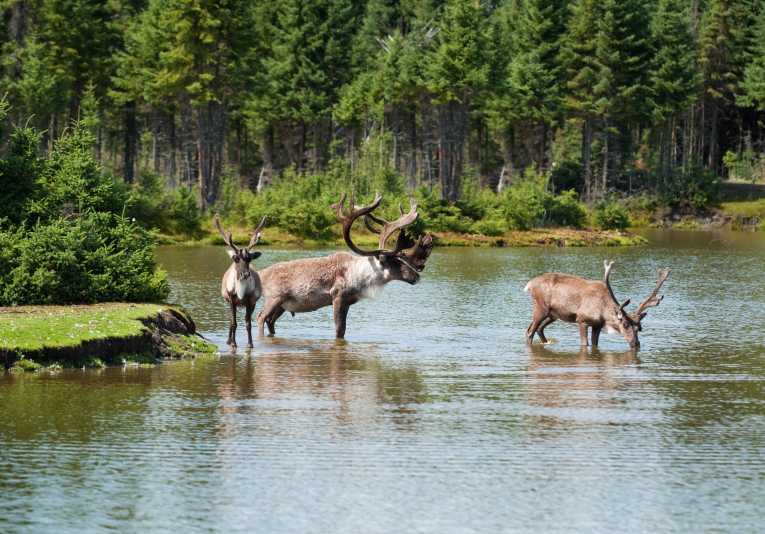Canadian oil-sands aren't just a global warming headache, courtesy of their massive carbon footprint - they're also a big stress-factor for the caribou roaming Alberta's forests. That's the conclusion drawn from a four-year study, into the long-term decline in caribou numbers in Canada's north-eastern state. Which is good news for the local wolf population, which had previously been implicated in the falling numbers of the magnificently-antlered reindeer. The new research is published in a paper in June's issue of Frontiers in Ecology and the Environment.
The corner of Alberta looked at by this study is home to thousands of red deer, nearly 400 moose, over 300 caribou, as well as 100-plus wolves - all to be found amongst 54,000 square miles of oil-sand deposits, which form part of the second largest oil reserve in the world. These loose, oil-rich sands stretch either side of the Athabasca River, and contain thick-tarry bitumen. This needs to be superheated by injected steam, just soften it enough to flow, a process that is widely recognized as one of the most environmentally-damaging ways to get fossil fuels out of the ground.
Extracting the sticky gloop, and converting it to a form that is usable as crude oil, requires up to 20% more CO2 emissions than conventional oil. Much of the tar from oil-sands was previously extracted by stripping the land of its pristine boreal forests and muskeg peat bogs. Nowadays, more of the oil is mined 'in situ' - pumping steam underground through injection wells, and draining the hot tar out via yet more wells. That requires the consumption of vast amounts of natural gas to power the steam generators; and of course, the construction of plenty of pipelines and well-head infrastructure.
It is the presence of pipelines, and the busy roads servicing the oil-sand industry, that may be causing problems for the caribou. Their numbers have been crashing over the last few decades, and if this continues, they may be gone within seven decades. In order to find out why this is happening, Samuel Wasser - from the University of Washington - turned to animal scat. By analyzing the hormones in sampled deer and wolf poop, Wasser and his colleagues were able to see how well fed - or stressed - predator and prey were, across a wide area.
After four years of careful poop collection - using dogs specially trained to sniff out the animal droppings - the team were able to work out the population, preferred habitats and food sources for red deer, caribou, moose and wolves. It was found that moose were bold, ranging wherever the food was, with low levels of stress-hormones, even when near to human-built features.
By contrast, caribou showed a clear preference for areas with good visibility - open and flat - and seemed highly stressed by the presence of man. Their scat had higher levels of stress hormones, and poorer levels of nutrition, close to those areas that man was active. The top predator of the area didn't seem too interested in the caribou, though. They preferred following their favorite food source, red deer, which made up 80% of their diet.
The results point to human structures, not wolves, as a probable stress factor for caribou. If these were adapted - by making pipeline follow forested areas for example - the paper's authors believe the situation for the local caribou could be improved. Though unconsidered is the broader possibility that caribou, moose, wolves - and indeed the planet - may be best served by looking for alternative energy sources to this most messy of fossil fuels.
Top Image Credit: © Howard Sandler










